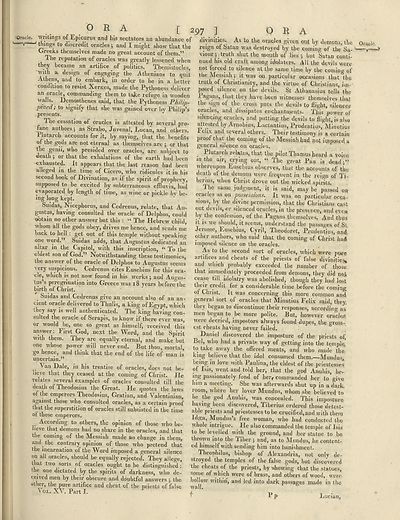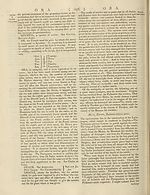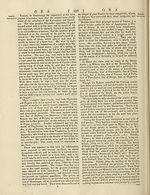Encyclopaedia Britannica > Volume 15, NIC-PAR
(347) Page 297
Download files
Complete book:
Individual page:
Thumbnail gallery: Grid view | List view

Oracle.
ORA [ 297 ]
writings of Epicurus and his sectators an abundance of divinities,
things to discredit oracles j and l might show that the
Greeks themselves made no great account of them.”
The reputation of oracles was greatly lessened when
they became an artihce of politics. Themistocles,
with a design of engaging the Athenians to quit
Athens, and to embark, in order to he in a better
condition to resist Xerxes, made the Pythoness deliver
an oracle, commanding them to take refuge in wooden
walls. Demosthenes said, that the Pythoness Philip-
pixed; to signify that she was gained over by Philip’s
presents.
Ine cessation of oracles is attested by several pro¬
fane authors 5 as Strabo, Juvenal, Lucan, and others.
Plutarch accounts for it, by saying, that the benefits
of the gods are not eternal as themselves are ; or that
the genii, who presided over oracles, are subject to
death ; or that the exhalations of the earth had been
exhausted, it appears that the last reason had been
alleged in the time of Cicero, who ridicules it in his
second book of Divination, as if the spirit of prophecy,
supposed to be excited by subterraneous effluvia, had
evaporated by length of time, as wine or pickle by be¬
ing long kept.
Suidas, Nicephorus, and Cedrenus, relate, that Au¬
gustas, having consulted the oracle ofDelphos, could
obtain no other answer but this : “ The Hebrew child,
whom all the gods obey, drives me hence, and sends me
back to hell : get out of this temple without speaking-
one word.” Suidas adds, that Augustus dedicated an
altar in the Capitol, with this inscription, “ To the
eldest son of God.” Notwithstanding these testimonies,
the answer of the oracle of Delphos to Augustus seems
very suspicious. Cedrenus cites Eusebius for this ora¬
cle, which is not now found in his works; and Aiums-
tus’s peregrination into Greece was 18 years before the
birth of Christ.
Suidas and Cedrenus give an account also of an an¬
cient oracle delivered to Thulis, a king of Egypt, which
they say is well authenticated. The king having con¬
sulted the oracle of Serapis, to know if there ever was,
or would be, one so great as himself, received this
answer: First God, next the Word, and the Spirit
with them. They are equally eternal, and make but
one whose power will never end. But thou, mortal,
go hence, and think that the end of the life of man is
uncertain.”
. Dale, in his treatise of oracles, does not be¬
lieve that they ceased at the coming of Christ. He
relates several examples of oracles consulted till the
death of Theodosius the Great. He quotes the laws
of the emperors Theodosius, Gratian, and Valentinian,
against those who consulted oracles, as a certain proof
that the superstition of oracles still subsisted in the time
of those emperors.
According to others, the opinion of those who be¬
lieve that demons had no share in the oracles, and that
the coming of the Messiah made ho change in them,
and the contrary opinion of those who pretend that
the incarnation of the Word imposed a general silence
on all oracles, should be equally rejected. They allege,
t lat two sorts of oracles ought to be distinguished:
the one dictated by the spirits of darkness, who de¬
ceived men by their obscure and doubtful answers ; the
0 R A
As to the oracles given out by demons, the
reign of Satan was destroyed by the coming of the Sa¬
viour; truth shut the mouth of lies ; but Satan conti¬
nued his old craft among idolaters. All the devils were
not forced to silence at the same time by the coming of
the Messiah ; it was on particular occasions that the
truth of Christianity, and the virtue of Christians, im¬
posed silence on the devils. St Athanasius tells the
Pagans, that they have been witnesses themselves that
the sign of the cross puts the devils to flight, silence?
oracles, and dissipates enchantments. This power of
silencing oracles, and putting the devils to flight, is also
attested by Arnobius, Lactantius, Prudentius, Minutius
Jelix and several others. Their testimony is a certain
proof that the coming of the Messiah had not imposed a
general silence on oracles.
. Plutarch relates, that the pilot Hiamusjieard a Voice
in the air, crying out, “ The great Pan is dead
whereupon Eusebius observes, that the accounts of the
death of the demons were frequent in the reign of Ti-
berms, when Christ drove out the wicked spirits.
The same judgment, it is said, may be passed on
oracles as on possessions. It was on particular occa¬
sions, by the divine permission, that the Christians cast
out devils, -or silenced oracles, in the presence, and even
by the confession, of the Pagans themselves, _4nd thus
it is we should, it seems, understand the passages of St
Jerome, Eusebius, Cyril, Theodoret, Prudentius, and.
other authors, who said that the coming of Christ had
imposed silence on the oracles.
As to the second sort of oracles, which were pure
artiflees and cheats of the priests of false divinities*
and which probably exceeded the number of those
that immediately proceeded from demons, they did not
cease till idolatry was abolished, though they had lost
their credit for a considerable time before the coming
of Christ. It was concerning this more common and
general sort of oracles that Minutius Felix said, they
they began to discontinue their responses, according as,
other, the pure artifice and cheat of the priests of false
V ol. XV. Part I.
men began to be more polite. But, however oracles
were decried, impostors always found dupes, the gross¬
est cheats having never failed.
Daniel discovered the imposture of the priests of(
Bel, who had a private way of getting into the temple*
to take away the offered meats, and who made the
king believe that the idol consumed them.—Mundus,
being in love witli 1 aulina, the eldest of the priestesses
of Isis, went and told her, that the god Anubis, be¬
ing passionately fond of heiy commanded her to give
him a meeting. She was afterwards shut up in a dark
room, where her lover Mundus, whom she believed to
he the god Anubis, was concealed. This imposture
having been discovered, Tiberius ordered those detest¬
able priests and priestesses to be crucified, and with them
Idrca, Mundus’s free woman, who had conducted the
whole intrigue. He also commanded the temple of Isis
to be levelled with the ground, and her statue to be
thrown into the liber ; and, as to Mundus, he content¬
ed himself with sending him into banishment.
rheonliilus, bishop of Alexandria, not only de¬
stroyed the temples of the false gods, but discovered
the cheats of the priests, by ■showing that the statues,
some of which were of brass, and others of wood, were
hollow within, and led into dark passages made in the
wall.
f Pp
Oracle.
Lucian,
ORA [ 297 ]
writings of Epicurus and his sectators an abundance of divinities,
things to discredit oracles j and l might show that the
Greeks themselves made no great account of them.”
The reputation of oracles was greatly lessened when
they became an artihce of politics. Themistocles,
with a design of engaging the Athenians to quit
Athens, and to embark, in order to he in a better
condition to resist Xerxes, made the Pythoness deliver
an oracle, commanding them to take refuge in wooden
walls. Demosthenes said, that the Pythoness Philip-
pixed; to signify that she was gained over by Philip’s
presents.
Ine cessation of oracles is attested by several pro¬
fane authors 5 as Strabo, Juvenal, Lucan, and others.
Plutarch accounts for it, by saying, that the benefits
of the gods are not eternal as themselves are ; or that
the genii, who presided over oracles, are subject to
death ; or that the exhalations of the earth had been
exhausted, it appears that the last reason had been
alleged in the time of Cicero, who ridicules it in his
second book of Divination, as if the spirit of prophecy,
supposed to be excited by subterraneous effluvia, had
evaporated by length of time, as wine or pickle by be¬
ing long kept.
Suidas, Nicephorus, and Cedrenus, relate, that Au¬
gustas, having consulted the oracle ofDelphos, could
obtain no other answer but this : “ The Hebrew child,
whom all the gods obey, drives me hence, and sends me
back to hell : get out of this temple without speaking-
one word.” Suidas adds, that Augustus dedicated an
altar in the Capitol, with this inscription, “ To the
eldest son of God.” Notwithstanding these testimonies,
the answer of the oracle of Delphos to Augustus seems
very suspicious. Cedrenus cites Eusebius for this ora¬
cle, which is not now found in his works; and Aiums-
tus’s peregrination into Greece was 18 years before the
birth of Christ.
Suidas and Cedrenus give an account also of an an¬
cient oracle delivered to Thulis, a king of Egypt, which
they say is well authenticated. The king having con¬
sulted the oracle of Serapis, to know if there ever was,
or would be, one so great as himself, received this
answer: First God, next the Word, and the Spirit
with them. They are equally eternal, and make but
one whose power will never end. But thou, mortal,
go hence, and think that the end of the life of man is
uncertain.”
. Dale, in his treatise of oracles, does not be¬
lieve that they ceased at the coming of Christ. He
relates several examples of oracles consulted till the
death of Theodosius the Great. He quotes the laws
of the emperors Theodosius, Gratian, and Valentinian,
against those who consulted oracles, as a certain proof
that the superstition of oracles still subsisted in the time
of those emperors.
According to others, the opinion of those who be¬
lieve that demons had no share in the oracles, and that
the coming of the Messiah made ho change in them,
and the contrary opinion of those who pretend that
the incarnation of the Word imposed a general silence
on all oracles, should be equally rejected. They allege,
t lat two sorts of oracles ought to be distinguished:
the one dictated by the spirits of darkness, who de¬
ceived men by their obscure and doubtful answers ; the
0 R A
As to the oracles given out by demons, the
reign of Satan was destroyed by the coming of the Sa¬
viour; truth shut the mouth of lies ; but Satan conti¬
nued his old craft among idolaters. All the devils were
not forced to silence at the same time by the coming of
the Messiah ; it was on particular occasions that the
truth of Christianity, and the virtue of Christians, im¬
posed silence on the devils. St Athanasius tells the
Pagans, that they have been witnesses themselves that
the sign of the cross puts the devils to flight, silence?
oracles, and dissipates enchantments. This power of
silencing oracles, and putting the devils to flight, is also
attested by Arnobius, Lactantius, Prudentius, Minutius
Jelix and several others. Their testimony is a certain
proof that the coming of the Messiah had not imposed a
general silence on oracles.
. Plutarch relates, that the pilot Hiamusjieard a Voice
in the air, crying out, “ The great Pan is dead
whereupon Eusebius observes, that the accounts of the
death of the demons were frequent in the reign of Ti-
berms, when Christ drove out the wicked spirits.
The same judgment, it is said, may be passed on
oracles as on possessions. It was on particular occa¬
sions, by the divine permission, that the Christians cast
out devils, -or silenced oracles, in the presence, and even
by the confession, of the Pagans themselves, _4nd thus
it is we should, it seems, understand the passages of St
Jerome, Eusebius, Cyril, Theodoret, Prudentius, and.
other authors, who said that the coming of Christ had
imposed silence on the oracles.
As to the second sort of oracles, which were pure
artiflees and cheats of the priests of false divinities*
and which probably exceeded the number of those
that immediately proceeded from demons, they did not
cease till idolatry was abolished, though they had lost
their credit for a considerable time before the coming
of Christ. It was concerning this more common and
general sort of oracles that Minutius Felix said, they
they began to discontinue their responses, according as,
other, the pure artifice and cheat of the priests of false
V ol. XV. Part I.
men began to be more polite. But, however oracles
were decried, impostors always found dupes, the gross¬
est cheats having never failed.
Daniel discovered the imposture of the priests of(
Bel, who had a private way of getting into the temple*
to take away the offered meats, and who made the
king believe that the idol consumed them.—Mundus,
being in love witli 1 aulina, the eldest of the priestesses
of Isis, went and told her, that the god Anubis, be¬
ing passionately fond of heiy commanded her to give
him a meeting. She was afterwards shut up in a dark
room, where her lover Mundus, whom she believed to
he the god Anubis, was concealed. This imposture
having been discovered, Tiberius ordered those detest¬
able priests and priestesses to be crucified, and with them
Idrca, Mundus’s free woman, who had conducted the
whole intrigue. He also commanded the temple of Isis
to be levelled with the ground, and her statue to be
thrown into the liber ; and, as to Mundus, he content¬
ed himself with sending him into banishment.
rheonliilus, bishop of Alexandria, not only de¬
stroyed the temples of the false gods, but discovered
the cheats of the priests, by ■showing that the statues,
some of which were of brass, and others of wood, were
hollow within, and led into dark passages made in the
wall.
f Pp
Oracle.
Lucian,
Set display mode to:
![]() Universal Viewer |
Universal Viewer | ![]() Mirador |
Large image | Transcription
Mirador |
Large image | Transcription
Images and transcriptions on this page, including medium image downloads, may be used under the Creative Commons Attribution 4.0 International Licence unless otherwise stated. ![]()
| Encyclopaedia Britannica > Encyclopaedia Britannica > Volume 15, NIC-PAR > (347) Page 297 |
|---|
| Permanent URL | https://digital.nls.uk/192586209 |
|---|
| Attribution and copyright: |
|
|---|
| Shelfmark | EB.11 |
|---|---|
| Description | Ten editions of 'Encyclopaedia Britannica', issued from 1768-1903, in 231 volumes. Originally issued in 100 weekly parts (3 volumes) between 1768 and 1771 by publishers: Colin Macfarquhar and Andrew Bell (Edinburgh); editor: William Smellie: engraver: Andrew Bell. Expanded editions in the 19th century featured more volumes and contributions from leading experts in their fields. Managed and published in Edinburgh up to the 9th edition (25 volumes, from 1875-1889); the 10th edition (1902-1903) re-issued the 9th edition, with 11 supplementary volumes. |
|---|---|
| Additional NLS resources: |
|

